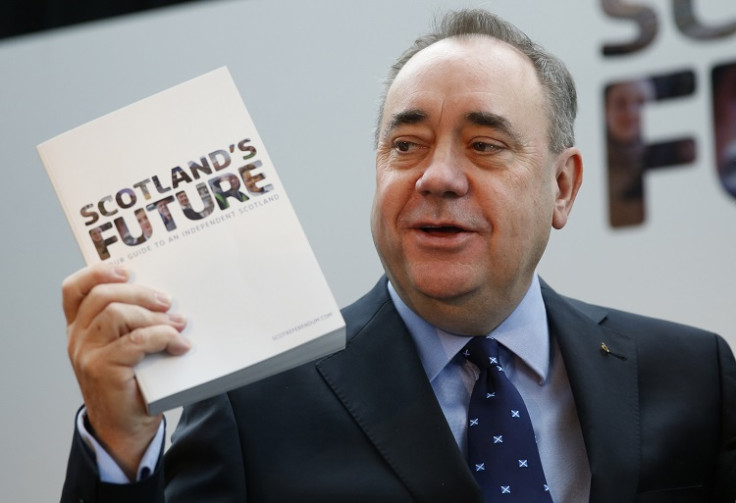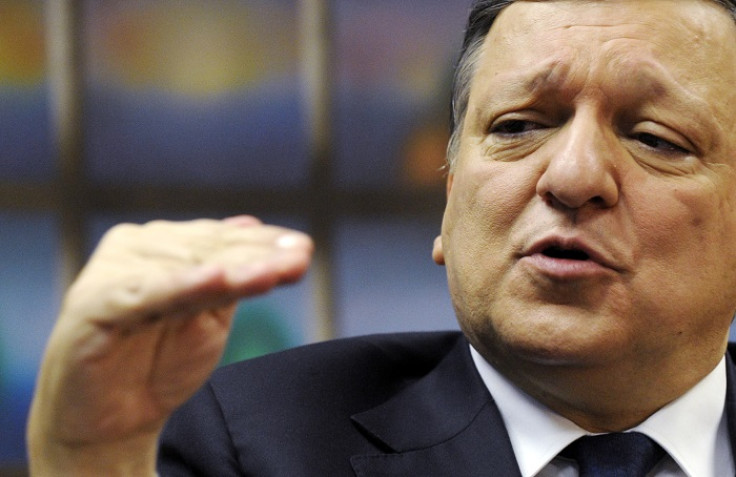SNP's Alex Salmond Fights Rearguard Action Against 'Negative' Westminster Assault on Scottish Independence

Scotland's first minister, Alex Salmond, has suddenly found the campaign to lead his country to independence facing its most serious challenge yet amid claims he has failed to answer key questions over the future of a new Scottish state.
After months of low-level sniping, the genuinely historic battle has now become brutal and Salmond has been thrown onto the defensive, claiming there is a negative campaign being run from Westminster in an attempt to bully and frighten voters into rejecting independence.
The battle between the "yes" and "no" camps intensified dramatically when the three big Westminster parties insisted an independent Scotland could not keep sterling, and European Commission president Jose Manuel Barroso said a new state would find it "extremely difficult if not impossible" to join the EU.
But, speaking in Aberdeen, Salmond insisted the arguments over both sterling and the EU would change dramatically after the referendum, declaring: "the campaigning will stop and the common sense agreements will start" as "enlightened self-interest" prevailed.
His arguments are nonsensical.....if you want to avoid the costs to businesses, don't vote for independence.
He made a powerful case rebutting chancellor George Osborne's economic argument against currency union, claiming he had played down the negative consequences of not sharing sterling in what was "not an economic case but a campaign tactic".
Specifically, he said, not having a common currency would impose transaction costs on cross-border British businesses running to hundreds of millions of pounds in a "George Tax", as he dubbed it.
As for EU membership, he claimed many countries had been admitted to the union and, following a "yes" vote in Scotland, the EU would find a pragmatic way to allow it to join as well.
He said the negative and destructive campaign coming from Westminster would "boomerang" back onto the anti-independence leaders because Scottish voters would not take kindly to being bullied and told what they can and cannot do from London.

And there is undoubtedly an emotional element to the independence campaign but Salmond cannot rely on that to win his case for him, and his opponents are already claiming he has still failed to answer the key questions posed over sterling and the EU.
And to a great extent he can't answer them because they are out of his control. Whether or not an independent Scotland can force a currency union with the rest of Britain, or join the EU - and do so without joining the euro – are decisions that will be taken elsewhere.
So he is forced to rely on claims that the "no" campaign's arguments are negative and over-hyped and are only being deployed for the purposes of the referendum in September.
Once that vote has been held, and assuming there is a vote for independence, there will be 18 months between the poll and separation that will allow common sense negotiations over these issues.
But that represents a big risk for Salmond, which was spelt out by the head of the "Better Together" campaign, Labour's Alistair Darling who said many of the problems Salmond was trying to address were of his own making.
For example, the issue of cross-border costs was real but would only exist if Scotland separated, meanwhile he refused to say what his "plan B" was for a Scottish currency.
"His arguments are nonsensical.....if you want to avoid the costs to businesses, don't vote for independence," he said.
And that is a powerful weapon for the "no" campaign. As Salmond attempts to address some of the huge questions about an independent Scotland's future, they will claim he is struggling to solve problems that would not exist if Scotland remained part of the UK.
Salmond, however, will be banking on the Scots accepting his view that many of the current arguments are purely campaigning rhetoric and the problems posed by the "no" campaign would be solved in a sensible way for both sides in the event of a "yes" vote.
© Copyright IBTimes 2024. All rights reserved.






